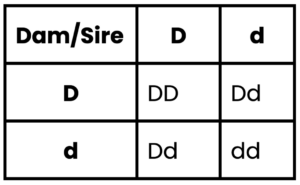Signalment
- Two purebred rhodesian ridgebacks intended for breeding
History & Presenting Complaint
- Would like genetic testing to see if they are a good pair for breeding.
Physical Exam
- Both dogs have normal exams
What are the predicted phenotypes of the whelps, and in what proportions? This is an autosomal recessive trait.
Punnett Square:

On average, 50% of the litter of this mating will be a carrier of the gene for EOAD (Dd), 25% will be clear (DD), and 25% of dogs will be at-risk (dd).
What is your assessment and plan?
- Breeding was avoided for these two dogs, since both dogs are carriers for the mutation. Either of these dogs could be bred to a dog that is clear for the EOAD mutation to have 100% chance of no phenotypically deaf whelps. To fully remove the variant from the gene pool, both dogs should be removed from the breeding program.
Outcome
- Breeders avoided having puppies with EOAD
Learn More: Another Case
- A Rhodesian Ridgeback breeder accidentally bred two carriers together and three of the puppies tested at-risk for developing Early Onset Adult Deafness (EOAD). The breeder proactively started training the puppies to understand hand signals instead of verbal commands. She was able to find puppy owners who were prepared for their dogs to become deaf. All three puppies are now deaf, but received the training and support they needed to thrive in their new homes. Genetic testing helps breeders to make more informed breeding decisions.
- While this deafness cannot be prevented or treated in dogs with two copies of the variant, owners will know the cause of their dog’s hearing loss and the approximate time it will occur. They will be able to train their puppy using visual cues while the puppy can still hear.
References/Additional Resources
* Embark is not necessarily affiliated with any of these websites or references, and does not necessarily endorse their content.






